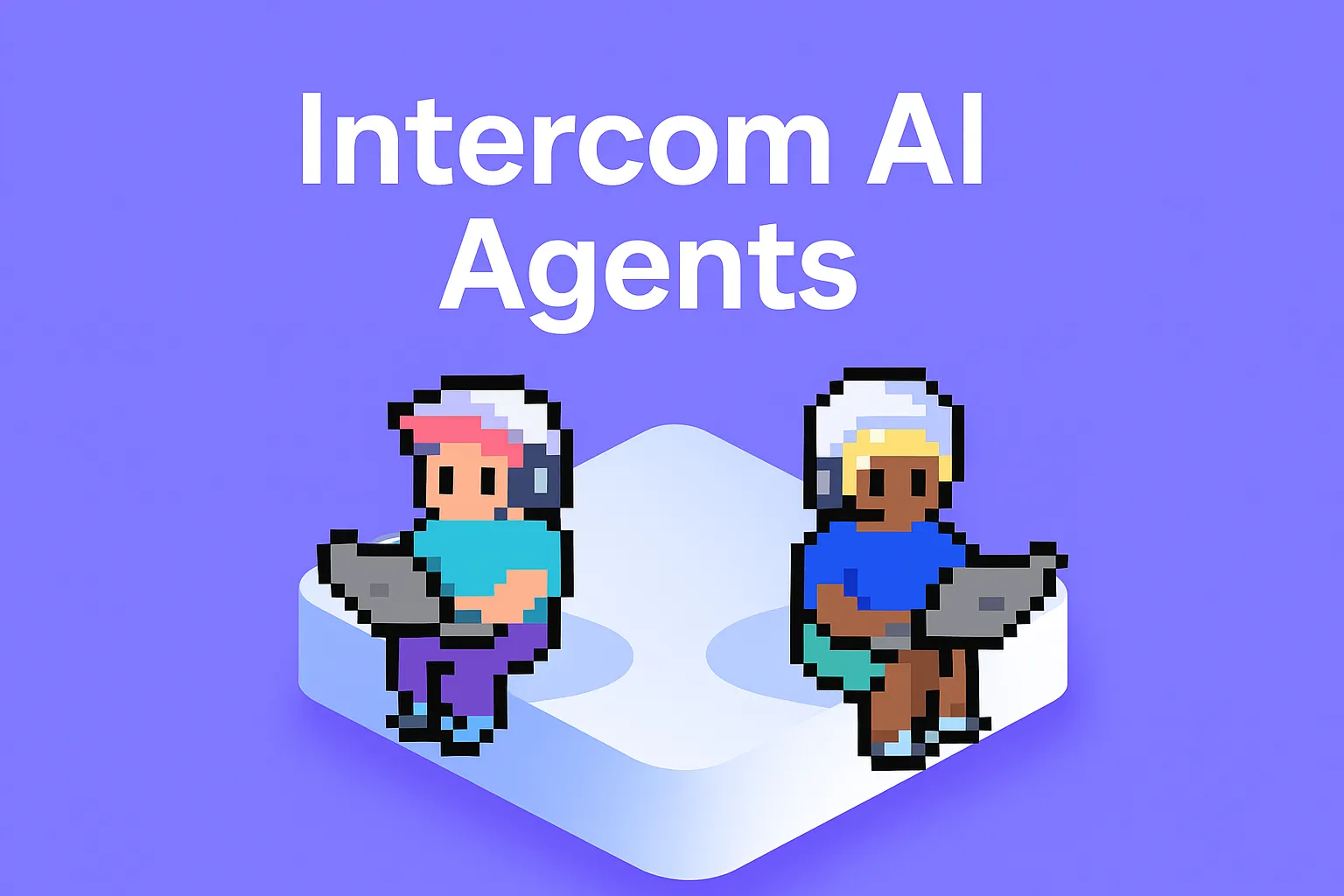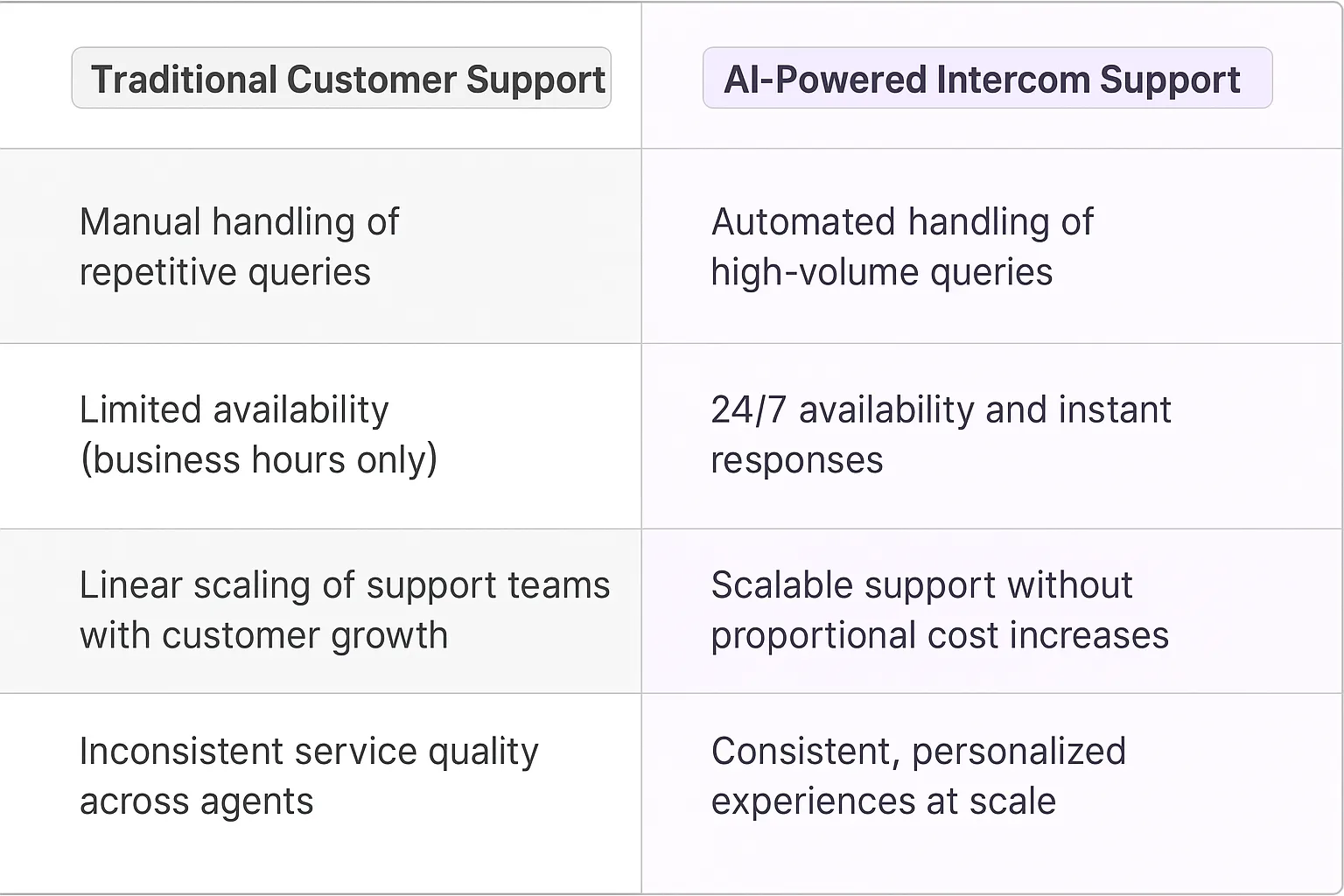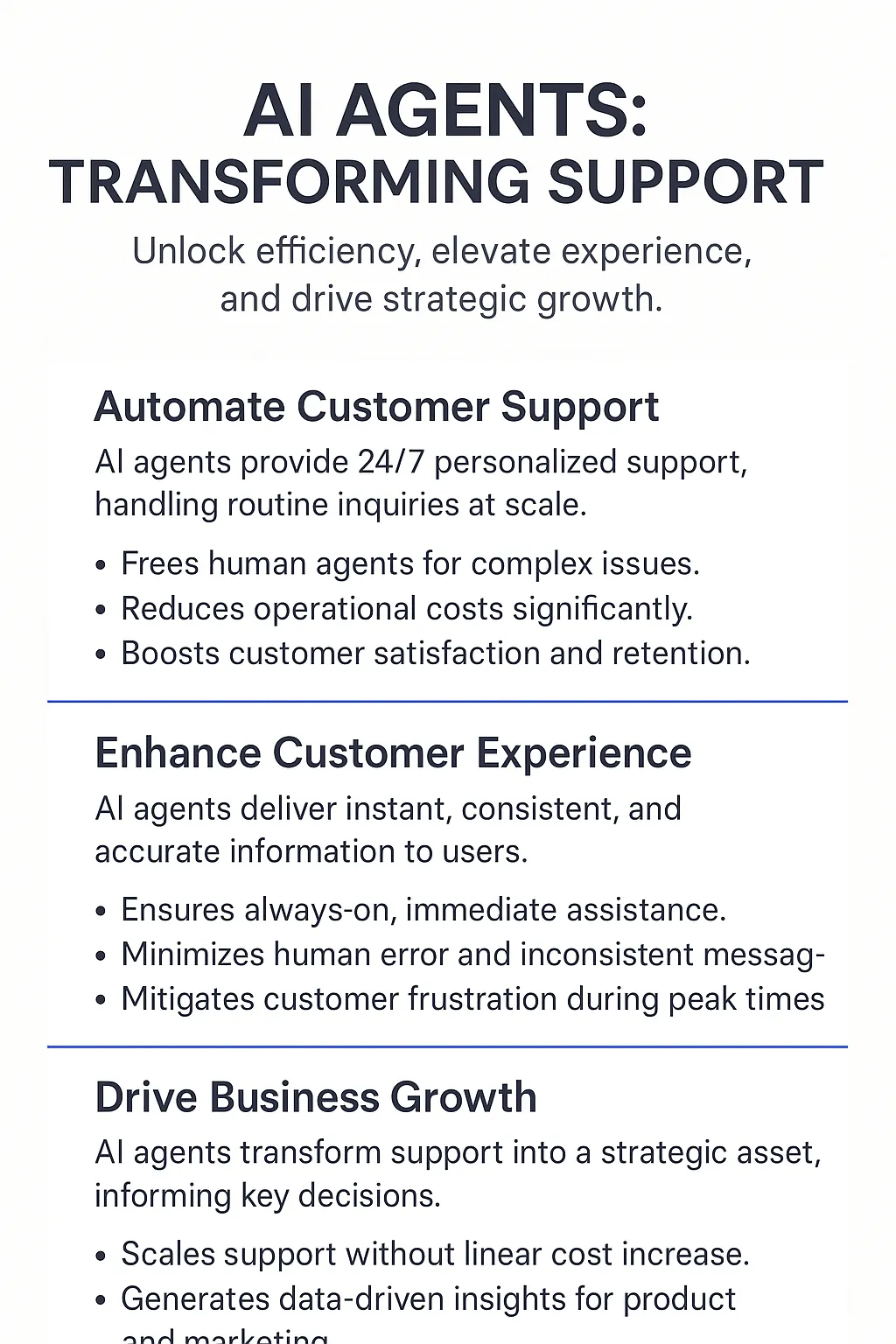Intercom AI Agents
Understanding Intercom
What is Intercom?
Intercom is a customer communication platform that's changing the game in how businesses interact with their users. It's not just another chat widget - it's a comprehensive suite of tools for engaging customers across their entire journey. From lead generation to support and retention, Intercom provides a unified interface for all customer conversations.
Key Features of Intercom
Intercom's power lies in its versatility. It offers live chat, targeted messaging, and a robust knowledge base system. But where it really shines is in its ability to segment users and deliver personalized communications at scale. The platform's automation capabilities allow businesses to trigger messages based on user behavior, ensuring timely and relevant interactions.
Now, with the integration of AI agents, Intercom is taking a quantum leap forward. These AI-powered digital teammates are not just handling routine queries - they're learning, adapting, and providing insights that can drive business strategy. They're turning Intercom from a communication tool into a powerhouse of customer intelligence.

Benefits of AI Agents for Intercom
Let's dive into the game-changing world of AI agents for Intercom. These digital teammates are reshaping customer support in ways we couldn't have imagined just a few years ago.
What would have been used before AI Agents?
Before AI agents entered the scene, Intercom relied heavily on human support teams. These dedicated professionals would manually sift through customer inquiries, often dealing with repetitive questions and time-consuming tasks. It was a constant battle against the clock, trying to maintain quick response times while providing personalized support. Companies would often need to scale their support teams linearly with customer growth, leading to ballooning costs and potential inconsistencies in service quality.
What are the benefits of AI Agents?
Now, with AI agents in the mix, we're seeing a radical shift in how customer support operates on Intercom. These digital teammates are not just tools; they're transformative forces that are redefining the entire support ecosystem.
First off, AI agents are absolute champions at handling high-volume, repetitive queries. They never sleep, never take breaks, and can engage with thousands of customers simultaneously. This 24/7 availability means businesses can provide instant support around the clock, dramatically reducing wait times and boosting customer satisfaction.
But it's not just about speed. These AI agents are getting smarter by the day, capable of understanding context and nuance in customer inquiries. They can draw from vast knowledge bases to provide accurate, consistent answers across a wide range of topics. This level of consistency is hard to achieve with human teams alone, especially as they scale.
One of the most exciting aspects is how AI agents are augmenting human support teams. By handling the bulk of routine queries, they free up human agents to focus on complex issues that require empathy, creativity, and strategic thinking. It's a perfect symbiosis of artificial and human intelligence, each playing to their strengths.
Moreover, AI agents are incredible data gatherers. Every interaction they handle becomes a data point, providing invaluable insights into customer behavior, common pain points, and emerging trends. This wealth of data can drive product improvements, refine marketing strategies, and inform business decisions.
The scalability factor is huge. As your customer base grows, AI agents can effortlessly scale to meet increased demand without a proportional increase in costs. This is a game-changer for startups and enterprises alike, allowing for rapid growth without the traditional growing pains in customer support.
Lastly, let's talk about personalization. AI agents can tap into customer history and preferences to deliver tailored experiences at scale. They can remember past interactions, anticipate needs, and provide relevant suggestions, creating a level of personalized service that would be incredibly resource-intensive to achieve with human agents alone.
In essence, AI agents for Intercom are not just improving customer support; they're redefining it. They're enabling businesses to provide faster, smarter, more consistent, and more personalized support at scale. It's a shift that's creating competitive advantages and setting new standards for customer experience in the digital age.
For businesses looking to implement these capabilities, having a dedicated Customer Success Manager can help ensure smooth integration and maximize the benefits of AI-powered customer support.

Potential Use Cases of AI Agents with Intercom
Processes
AI agents are reshaping customer support in ways we couldn't have predicted even a few years ago. With Intercom, these digital teammates are taking on complex processes that once required significant human intervention. They're not just answering simple queries; they're orchestrating entire customer journeys.
Consider onboarding. An AI agent can guide new users through Intercom's features, tailoring the experience based on the user's role and needs. It can trigger personalized product tours, schedule demo calls with sales reps for high-value prospects, and even help users set up their first chatbot - all without human intervention.
Another process ripe for AI enhancement is customer feedback collection and analysis. The agent can initiate surveys at key touchpoints, analyze responses in real-time, and escalate critical issues to human team members. It's not just about collecting data; it's about turning that data into actionable insights that drive product development and customer satisfaction.
Tasks
When it comes to specific tasks, AI agents are proving to be indispensable allies for Intercom users. They're handling the heavy lifting of customer communication, freeing up human agents to focus on high-value interactions.
One task where AI shines is triaging incoming customer queries. The agent can categorize issues, prioritize urgent matters, and route conversations to the right department or specialist. This isn't just about efficiency; it's about ensuring that every customer gets the right help at the right time.
AI agents are also excelling at data enrichment. They can pull relevant information from various sources - CRM systems, previous interactions, social media profiles - to provide a 360-degree view of the customer. This context allows for more personalized and effective communication, whether it's handled by the AI or passed to a human agent.
Another task where AI is making waves is in predictive support. By analyzing patterns in customer behavior and historical data, AI agents can anticipate issues before they arise. They can proactively reach out to customers with solutions, turning potential frustrations into moments of delight.
The real power of AI agents in Intercom lies in their ability to learn and improve over time. They're not static tools; they're evolving partners that get smarter with every interaction. As they handle more tasks and processes, they'll uncover insights and efficiencies that we haven't even considered yet.
This isn't about replacing human agents. It's about augmenting them, giving them superpowers to deliver exceptional customer experiences at scale. The companies that figure out how to harness this potential will have a significant competitive advantage in the customer support arena.

Industry Use Cases for Intercom AI Agents
The versatility of AI agents in Intercom makes them valuable across various industries. Let's dive into some meaty, industry-specific use cases that showcase how AI can transform workflows and processes. These aren't your run-of-the-mill examples – we're talking about real, tangible ways AI is reshaping how businesses interact with customers and handle support.
From e-commerce giants to SaaS startups, companies are leveraging Intercom's AI capabilities to create more efficient, personalized, and scalable customer experiences. We're seeing a shift from reactive to proactive support, where AI doesn't just respond to queries but anticipates needs and solves problems before they even arise.
But here's the kicker: it's not about replacing human support teams. It's about augmenting them, freeing up their time to focus on complex issues that require that human touch. The result? A symbiosis of human empathy and machine efficiency that's redefining customer engagement.
One of the most powerful applications is in customer segmentation, where AI agents can analyze user behavior patterns and automatically categorize customers for targeted support strategies. This enables businesses to deliver more relevant and effective customer experiences.
For organizations implementing these solutions, having a skilled Customer Experience Specialist can help design and optimize AI-driven customer journeys that truly resonate with users.
So, let's roll up our sleeves and explore how different industries are putting Intercom AI agents to work. These use cases aren't just theoretical – they're battle-tested strategies that are driving real results in the field.
E-commerce: Personalized Shopping Assistants
Let's talk about how Intercom AI Agents are reshaping e-commerce. These digital teammates are becoming the secret weapon for online retailers looking to create hyper-personalized shopping experiences.
Think about it: when you walk into a high-end boutique, you're greeted by a knowledgeable sales associate who knows the inventory inside and out. They ask about your preferences, suggest items, and even remember what you bought last time. Now, imagine that level of service, but available 24/7 to every single online shopper.
That's where Intercom AI Agents come in. They're not just chatbots; they're sophisticated digital retail experts. These agents can analyze a customer's browsing history, past purchases, and even social media activity to build a comprehensive profile. With this data, they offer tailored product recommendations that feel uncannily accurate.
But it goes beyond simple recommendations. These AI agents can engage in natural conversations, answering complex questions about product features, sizing, or material quality. They can even handle objections and provide compelling reasons to buy, just like a skilled human salesperson.
The real magic happens when these agents start to predict needs. Say a customer bought running shoes three months ago. The AI might reach out with a message like, "Hey Sarah, based on average wear patterns, your running shoes might be due for a replacement soon. Want to check out our latest models?"
This level of personalization and proactive service was once the domain of luxury brands with armies of personal shoppers. Now, with Intercom AI Agents, even small e-commerce players can offer a white-glove experience to every customer.
The impact? Higher conversion rates, increased average order values, and most importantly, customers who feel understood and valued. It's not just about selling more stuff; it's about building lasting relationships that keep shoppers coming back.
Advanced AI agents excel at delivering personalized recommendations by analyzing customer data and behavior patterns to suggest products that truly match individual preferences and needs.
For e-commerce businesses looking to implement these capabilities, working with a dedicated Sales Development Representative can help optimize the sales process and ensure AI agents are properly configured to drive conversions.
As these AI agents continue to learn and evolve, we're looking at a future where online shopping becomes an intensely personal, almost intuitive experience. The line between digital and human interaction will blur, creating a new standard for what customers expect from online retail.
E-commerce players who embrace this technology early will have a significant edge. They're not just adopting a new tool; they're fundamentally reimagining the online shopping experience. And in a world where customer experience is the ultimate differentiator, that's a game-changer.
Healthcare: AI-Powered Patient Support Systems
The healthcare industry is ripe for disruption, and Intercom AI Agents are leading the charge. These digital teammates are transforming patient care in ways we couldn't have imagined just a few years ago.
Let's break it down. Healthcare providers are constantly juggling patient needs, administrative tasks, and the ever-present challenge of providing personalized care at scale. Enter Intercom AI Agents - they're not replacing doctors, but they're becoming indispensable allies in patient care.
These AI agents are like having a dedicated health concierge for every patient. They can handle appointment scheduling, medication reminders, and even preliminary symptom assessments. But that's just scratching the surface.
The real power lies in their ability to learn and adapt. These agents can analyze a patient's medical history, lifestyle data, and even genetic information to provide tailored health advice. Imagine an AI that notices you've been logging more sedentary hours than usual and proactively suggests exercises tailored to your specific health conditions.
But it's not just about individual patient care. These AI agents are becoming crucial in managing population health. They can identify trends, predict outbreaks, and help healthcare providers allocate resources more effectively.
One of the most exciting applications is in mental health. AI agents can provide 24/7 support for patients dealing with anxiety or depression, offering coping strategies or escalating to human professionals when necessary. This constant availability could be a game-changer in crisis prevention.
The impact on patient outcomes could be profound. By providing consistent, personalized care between doctor visits, these AI agents could help catch potential issues early, improve medication adherence, and ultimately lead to better health outcomes.
Healthcare organizations implementing these systems often benefit from having a skilled Customer Support Representative who understands both healthcare workflows and AI capabilities to ensure seamless patient interactions.
Of course, there are challenges. Data privacy is paramount, and there's a delicate balance between helpful and intrusive. But the potential benefits are too significant to ignore.
We're moving towards a future where healthcare is proactive, not reactive. Where every patient has a digital health companion that knows their history, understands their needs, and can provide support at any time.
For healthcare providers, embracing this technology isn't just about staying competitive - it's about fundamentally improving the quality of care they can provide. And for patients, it's about having a healthcare experience that's more personal, more accessible, and ultimately more effective.
The healthcare providers who get ahead of this curve won't just be adopting new technology - they'll be pioneering a new standard of patient care. And in an industry where outcomes are everything, that's a powerful position to be in.
Considerations and Challenges for Intercom AI Agents
Implementing AI agents for Intercom isn't just a plug-and-play solution. It's a complex endeavor that requires careful planning and execution. Let's dive into the nitty-gritty of what you'll need to consider and the hurdles you'll face.
Technical Challenges
First up, the tech stack. You're not just dealing with a simple chatbot here. Intercom AI agents need to integrate seamlessly with your existing systems. This means grappling with API integrations, data flow management, and ensuring your infrastructure can handle the increased load.
Natural Language Processing (NLP) is another beast to tame. Your AI agent needs to understand context, nuance, and even sarcasm. It's not just about keyword matching anymore. You'll need to train your model on a diverse dataset that reflects your customer base's language patterns and quirks.
Then there's the issue of real-time processing. Customers expect instant responses. Your AI needs to analyze queries, fetch relevant data, and formulate responses in milliseconds. This requires some serious computational muscle and clever algorithms.
Operational Challenges
On the ops side, you're looking at a significant shift in how your customer service team operates. Your human agents will need to learn to work alongside their digital teammates. This isn't just about training; it's about fostering a culture that embraces AI as a tool, not a threat.
Data privacy is another minefield. Your AI agent will be handling sensitive customer information. You need robust security measures and clear data handling policies. GDPR, CCPA, and other regulations aren't just buzzwords - they're legal requirements you can't ignore.
Scalability is crucial. As your business grows, can your AI agent keep up? You need to design a system that can handle increasing volumes of queries without degrading performance or accuracy.
For organizations navigating these complex technical challenges, having an experienced Technical Support Manager can be invaluable in ensuring smooth implementation and ongoing optimization of AI systems.
Finally, there's the challenge of continuous improvement. AI isn't set-it-and-forget-it tech. You need processes in place to monitor performance, gather feedback, and iteratively improve your AI agent. This means dedicating resources to ongoing development and maintenance.
Implementing an Intercom AI agent is a journey, not a destination. It requires a blend of technical expertise, operational savvy, and a willingness to adapt. But get it right, and you'll have a powerful tool that can transform your customer interactions.
Embracing the AI-Powered Future of Customer Engagement
The integration of AI agents into Intercom is more than just a technological upgrade - it's a paradigm shift in customer engagement. These digital teammates are redefining what's possible in customer support, enabling businesses to provide personalized, scalable, and proactive service around the clock.
But here's the kicker: we're just scratching the surface. As AI technology continues to evolve, we'll see even more sophisticated applications. Imagine AI agents that can predict customer needs before they arise, or that can seamlessly handle complex, multi-step processes without human intervention.
The businesses that embrace this technology early and effectively will have a significant competitive advantage. They'll be able to deliver exceptional customer experiences at scale, while simultaneously gaining deep insights into customer behavior analysis and preferences.
However, it's crucial to remember that AI is not a silver bullet. The most successful implementations will be those that find the right balance between AI efficiency and human empathy. The future of customer engagement isn't about replacing humans with AI - it's about creating a symbiosis that leverages the strengths of both.
Organizations looking to lead this transformation often benefit from having a strategic Business Operations Manager who can oversee the integration of AI technologies while ensuring alignment with broader business objectives.
As we move forward, the companies that thrive will be those that view AI not just as a tool, but as a strategic partner in their customer engagement efforts. The age of AI-powered customer experience is here, and it's transforming the way businesses connect with their customers. Are you ready to lead the charge?













